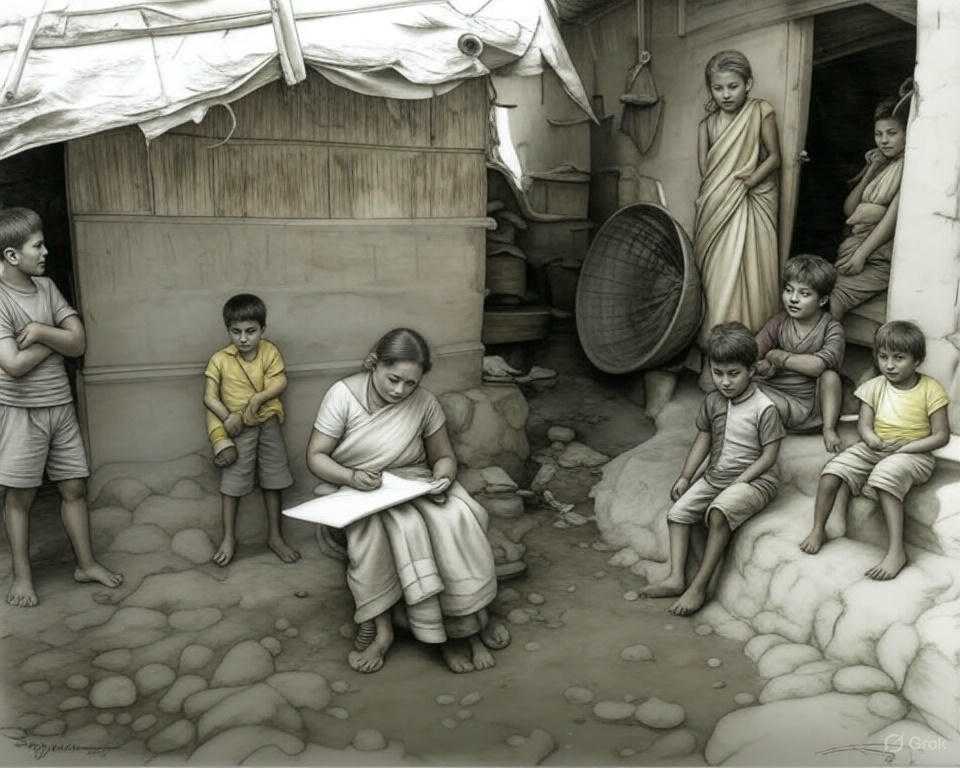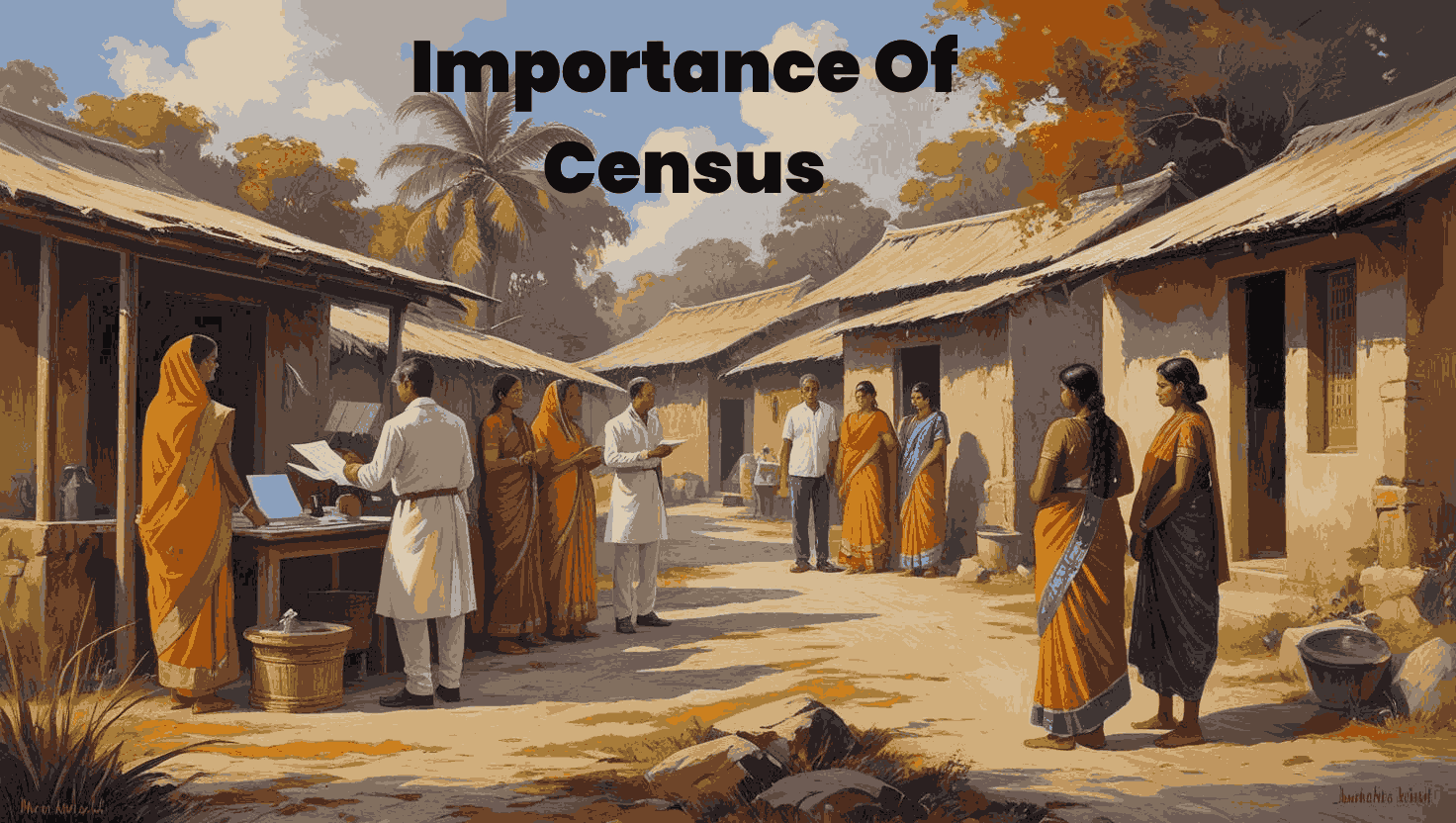Why Counting Every Person(Why census is important) Changes Your School, Hospital, and Future
(You might not see census workers knocking on doors until 2027, but this giant “people count” decides if your town gets new schools, clean water, or even women leaders in Parliament. Here’s why forgetting your census form could break your future.)*
What if no one counted you?
Imagine your school not knowing how many students will come next year. They might run out of chairs, books, or teachers! That’s exactly why India does a census every 10 years – a giant headcount of every person.
The Ripple Effect
| Census Data | → | Changes in Your Life |
|---|---|---|
| Finds 500 kids in your area | → | New school built near you |
| Shows water shortages | → | Pipes bring clean water |
| Reveals poor internet | → | Free Wi-Fi zones appear |
| Counts elderly people | → | Health clinics open |
2027’s 3 Superpowers
- Caste Clarity
- Before: Only SC/ST groups counted
- *2027*: All Hindu castes recorded → Fair help for struggling communities
- Women Rise
1 in 3 Parliament seats → reserved for women → based on census maps - Voice for All States
- Big states (UP, Bihar) gain MPs
- Small states (Kerala, Goa) fight to keep seats
Your Phone’s Secret Link
Even your smartphone connects to the census! When data shows:
- Many internet users → Free online classes start
- Few farmers with phones → Digital crop alerts launch
What if we SKIPPED the census?
→ Hospitals without enough beds
→ Villages with no electricity
→ Schools overcrowded

Table of Contents
What is a Census?
A census is like a giant photograph of India taken every 10 years. It counts every person, home, job, language, and age group. Think of it as a highly detailed map that helps leaders make informed decisions.
History Snapshot:
| Year | Event | Importance |
|---|---|---|
| 1881 | First modern Indian Census | Started by British rulers |
| 1931 | Last full caste count | Stopped after this year |
| 1948 | Census Act passed | Rules for how it’s done |
| 2027 | Next Census (delayed) | Will count caste for all Hindus |
How the Census Works: Two Steps
Phase 1: House Listing (6 months)
Workers visit every home to ask about:
- 🏠 House material (brick, wood, or concrete?)
- 💧 Water sources (tap, well, or river?)
- 🚽 Toilets (at home or shared?)
- 📱 Assets (bicycle, phone, internet?)
Why this matters:
If many houses lack clean water, the government builds more water pipes. If most homes have smartphones, digital schools can be planned.
Phase 2: Population Enumeration (February-March)
Workers return to ask about people:
- 👶 Your name, age, and gender
- 📚 Education and job
- 🗣️ Language and religion
- ✋ Whether you’re from SC/ST communities
Why this matters:
Finding many children in an area? More schools will open there. Many elderly people? Hospitals add special care units.
why census is important [2027]
- Caste Counting Returns
- Before 1931,
- , healthcare).Make welfare programs fairer.
Like a teacher giving extra help to students struggling in math, caste data helps lift up groups facing historical disadvantages. - Women’s Power in Politics
- 33% of seats in Parliament and State Assemblies will be reserved for women.Census data decides where these seats are created.
If your mom or sister wants to lead, this gives them a stronger voice in making laws! - Political Reshaping (Delimitation)
- After 2026, Parliament seats will be redistributed based on the 2027 Census data.
- States with growing populations gain more seats; others may lose some.
Why Some States Worry
| State Group | Concern | Real-Life Example |
|---|---|---|
| Southern States (Kerala, Tamil Nadu) | “We controlled our population growth. Will we lose political power to bigger states?” | Like a class where quieter students get fewer votes in elections. |
| Small States (Sikkim, Goa) | “Our voice in Parliament could disappear!” | A small shop competing against a mall. |
| Northeast States | “Our unique cultures need protection.” | Preserving rare wildlife in a forest. |
Solution Needed:
A fair formula so that fast-growing states (like UP, Bihar) get more seats without silencing smaller states.
The Census and Your Daily Life
(It’s not just numbers—it’s about your future!)
1. Schools & Colleges
- Census shows where children live → New schools are built nearby.
- Finding a few engineers? → More IT colleges open.
2. Hospitals & Clinics
- Many elderly people? → Build geriatric care centers.
- Disease outbreaks mapped → Vaccines sent quickly.
3. Roads & Trains
- Crowded cities? → Expand metros/highways.
- Remote villages? → Connect with new roads.
4. Environment
- Water sources mapped → Drought areas get help.
- Energy use tracked → Solar plants in sunny regions.
5. Culture & Language
- Counting languages → Preserves books, radio shows.
- Tribal traditions → Protects heritage sites.
Challenges Ahead
- Caste Data Accuracy
- Wrong counts could misdirect help.
- Example: If wealthy groups claim backwardness, real needy families lose aid.
- Balancing Power
- How to reward population control and respect growth?
- Idea: Cap total seats but add special votes for smaller states.
- Women’s Reservation Timing
- Should women get 33% seats immediately in 2029?
- Training programs are needed for new women leaders.
Your Thoughts Matter!
(Discuss with friends/family)
- Is it fair for states with fewer people to have less political power?
- How can caste data avoid creating new divisions?
- If women lead 1/3 of Parliament, what laws should they prioritize?
- Should migrants be counted in their home state or where they work?
Key Takeaways
- 📅 Next Census: 2027 (after COVID delays).
- ✨ Special Focus: Caste, women’s seats, political boundaries.
- ⚖️ Goal: Use data to build a fairer, stronger India.
“The Census is a mirror showing who we are—and a compass pointing where we must go.”


Leave a Comment